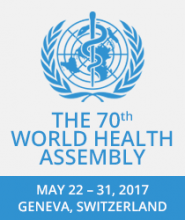World Health Assembly adopts "Working for Health" five-year action plan

This milestone presents an opportunity for accelerating progress towards universal health coverage and attaining the goals of the 2030 Agenda for Sustainable Development by ensuring equitable access to health workers within strengthened health systems.
In its resolution, the WHA underscored “that skilled and motivated health and social sector workers are integral to building strong and resilient health systems” and the importance of adequate workforce investments to meet needs in respect of universal health coverage and to develop core capacities under the International Health Regulations (2005), including the capacity of the domestic health workforce to ensure preparedness for and response to public health threats.
The High-Level Commission process, from which stemmed Working for Health, was itself historic. This would be the first time that different agencies of the United Nations would collaborate to such an extent. It should serve as a beacon for the cooperation and partnership expected of different ministries, departments and agencies in Member States, as well as between governments and social partners.
Concerted tripartite social dialogue within and across countries is the first step in the envisaged trajectory of change that will lead to transformation and scaling up of education, skills, and decent jobs creation needed for a sustainable health workforce globally.
Political support and momentum for building intersectoral commitment at global, regional and national levels would have to be galvanized, and mechanisms for social dialogue and policy dialogue strengthened. PSI has an important role to play as a major non-state actor in the health sector.
Rosa Pavanelli, PSI General Secretary, represented workers and the public services on the High-Level Commission. PSI equally made a commitment to support the implementation of the recommendations of the Commission, which have now been distilled out in the Five-Year Action Plan.
PSI and its affiliates will actively lobby governments and regional decision-making forums to fully commit to the implementation of the plan, as part of our Human Right to Health global campaign.
The health workforce is the backbone for healthcare delivery. Implementing the Five-Year Action Plan would go a long way to ensuring the WHO Global Strategy for Human Resources is achieved and the projected shortfall of 18 million health workers worldwide by 2030 avoided.

